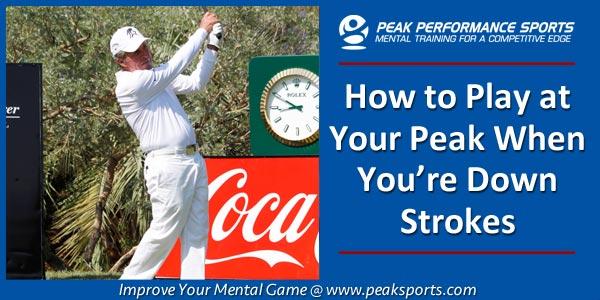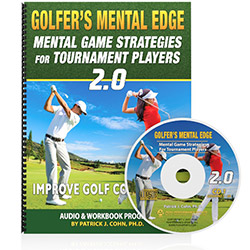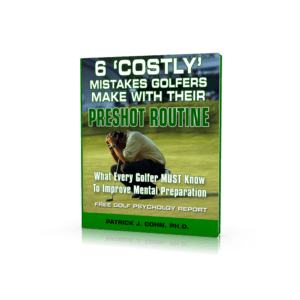
Your Mental Game in Golf
Golf is a game of ups and downs, great shots and easy misses, high and low scores, playing with the lead and playing from behind.
Playing a round from behind is one of the more challenging aspects in golf. It is a challenge every golfer will face at one time or another.
But isn’t that why you chose to play the sport of golf?… For the excitement?… For the challenges?
Each course, each round of golf, each tournament tests your physical and mental prowess.
Your mental game and what you focus on that determines if you overcome the challenges on the golf course.
You can choose what you focus on when trailing by 2-3 strokes in a tournament…
Do you think about the score (the outcome) or hitting good shots (the process)?
Why do some golfers fall apart when trailing by 2-3 strokes?
Many argue that focusing on the score helps motivate a golfer.
In reality, focusing on the outcome of a hole or the score is just a distraction from what you need to do for each shot.
When you focus on score, that can limit you when playing well or poorly.
In fact, worrying about the score does not change the score at all–it can hurt your score..
Preparing your best for each golf shot and focusing on execution affects your score. So, your focus should be on immersing yourself into your routine rather than, “I have to make up two strokes.”
Golf Legends And Their Comebacks
Most great professional golfers have made comebacks on the last day of play to win a tournament.
Jack Nicklaus won eight tournaments after being behind on the last day of play.
Arnold Palmer came from seven back at the 1960 U.S. Open in Cherry Hills to secure a victory.
Gary Player overcame a seven-shot deficit to win the 1978 Masters.
Nick Faldo won the 1989 Masters from five back and the 1996 Masters from six back.
You are probably thinking, “But they are champions and more skilled than I am.”
There is no doubt that skill helps in mounting a comeback but focusing on the process helped them hit great golf shots when needed.
How do you focus on the process when down 2-3 strokes?
First, when you focus on the process, the results will take care of themselves.
Think of the times you played your best golf and you will find that you were not analyzing every shot or thinking about possible scenarios at the end of the day.
Rather, you probably focused on doing your “homework” for each shot, committing to a plan, and having confidence you could execute the plan.
This has been your recipe for success in the past and is the mentality you want to adopt for each shot. This way, each shot becomes a round by itself.
Try these tips to play at your peak when down 2-3 strokes:
- Tip #1: Ask yourself the important questions, “How do I want to play this hole?” “What do I need to focus on right now?”
- Tip #2: Stick with your first instinct or decision and don’t second-guess every plan. Don’t over-think a chip shot by debating every possible way you can hit it. Trust your first plan and execute the shot with commitment.
Successful golfers have learned how to perform with ultimate confidence in competition. We’ve developed The Golfer’s Mental Edge Workbook and CD program to help you do this.
Learn Proven Strategies to Perform with Confidence!
Do you suffer from fragile self-confidence after missed hits, playing with strict or high expectations that undermine confidence or the inability to play freely and relaxed on the course?
If you suffer from lack of focus, low self-confidence or other mental game obstacles on the course, you cant reach your true golf potential…
What are students saying?
“The mental side is everything in golf—the ability to see your shot or line and trust that you can hit that shot or putt. Dr. Cohn has helped me trust my game and putting stroke.”
~Frank Lickliter, PGA Tour, Nike Tour Winner
“My confidence level has never been higher! I can’t tell you how clearly I was able to think during all four rounds of tour-school. The simple game plan you gave me really focused me. My confidence level has never been higher during a tournament. No matter how much pressure was on, I was able to control my thoughts and execute. Thank you Dr. Cohn!”
~Patricia Baxter-Johnson, LPGA Tour
 Learn Powerful Golf Confidence Strategies!
Learn Powerful Golf Confidence Strategies!
What are customers saying?
“Dr. Cohn, my golf game has improved since the very first time I landed on Peaksports.com! You gave me just enough information to improve immediately! After that, it was a mere no-brainer to become a Peaksports Subscriber! Thank you for helping me improve my game and enjoyment – even overnight! You are right on!”
~Randall Estes
Boost Your Self-Confidence And Focus With Expert Mental Game Coaching!
Master mental game coach Dr. Patrick Cohn can help you overcome your mental game issues with personal coaching.
You can work with Dr. Patrick Cohn himself in Orlando, Florida or via Skype, FaceTime, or telephone. Call us toll free at 888-742-7225 or contact us for more information about the different coaching programs we offer!
What are our students saying?
“WOW!!! What a week I had. I was able to perform with a confidence that allowed my style to shine through–no more entering the arena with that “deer in the headlights” look or feeling. I stopped evaluating myself while I was performing, and I actually left the arena after my patterns feeling like I had experienced a lot of fun. Thank you so much.”
~Julia Dreyer, National Champion Equestrian


 Learn Powerful Golf Confidence Strategies!
Learn Powerful Golf Confidence Strategies!